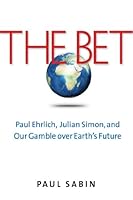
## Metadata
- Author: [[Paul Sabin]]
- Full Title: The Bet
- Category: #books
## Highlights
- Ehrlich delivered The Population Bomb to an audience receptive to grim predictions about the future. That same year saw Robert F. Kennedy and Martin Luther King Jr. assassinated, riots in Washington, DC, Chicago, and Kansas City, and student rebellions in Paris and Mexico City. Meanwhile, the death toll mounted in Vietnam. To these woes, Ehrlich added his warning of “vast famines” and his call for “radical surgery” to excise the “cancer” of runaway human population growth. ([Location 229](https://readwise.io/to_kindle?action=open&asin=B00E64EGZQ&location=229))
- The violent metaphors underscored how global population growth intersected with the Cold War struggle between the United States and the Soviet Union. As the United States and the Soviet Union battled for strategic advantage, they increasingly used economic development aid to win the allegiance of “Third World” nations. Population growth endangered these international development efforts. Hungry people, American policy-makers believed, were more susceptible to communist influence. Overpopulation and resource scarcity, a foreign aid report stated emphatically in 1959, created “opportunities for communist political and economic domination.” Americans looking abroad to prove the vitality of the capitalist model worried that their efforts would founder amid poverty and famine. “No peace and no power is strong enough to stand for long against the restless discontent of millions of human beings who are without any hope,” Lyndon B. Johnson warned in a 1966 speech.18 ([Location 394](https://readwise.io/to_kindle?action=open&asin=B00E64EGZQ&location=394))
- President Johnson had refused to send American wheat to India in 1966 until that country adopted a vigorous family planning program. ([Location 406](https://readwise.io/to_kindle?action=open&asin=B00E64EGZQ&location=406))
- “The first move must be to convince everybody to think of the earth as a space ship that can carry only so much cargo,” Ehrlich said in a 1967 speech. ([Location 452](https://readwise.io/to_kindle?action=open&asin=B00E64EGZQ&location=452))
- In signing the National Environmental Policy Act on January 1, 1970, his first official act of a new decade, Nixon declared himself convinced that the “1970’s absolutely must be the years when America pays its debt to the past by reclaiming the purity of its air, its waters, and our living environment. It is literally now or never.”45 ([Location 696](https://readwise.io/to_kindle?action=open&asin=B00E64EGZQ&location=696))
- Simon’s critique of population control in The Ultimate Resource reflected his personal values and his version of utilitarian philosophy. Simon differed from Ehrlich and other population control advocates in his attitude about the worth of human life. Ehrlich, complained Simon, said that nothing would be lost if fewer people existed and that the United States, and the world, would be better off with a smaller population. In 1972, when the United States population was almost 210 million people, Ehrlich had told a reporter, “I can’t think of any reason for having more than one hundred fifty million people.” Simon found this dismissal of the value of sixty million Americans to be cavalier. Ehrlich’s bleak descriptions of human misery further suggested to Simon that Ehrlich thought “poor people’s lives are not worth living.” Simon took up their cause. Writing of the impoverished beggars in India, Simon commented, “Ehrlich writes nothing about those people laughing, loving, or being tender to their children—all of which one also sees among those poor Indians.” Drawing on a utilitarian perspective that aspires to the greatest good for the greatest number, Simon contended, in his own variant of the theory, that more people living rewarding lives maximized social welfare. “Because people continue to live, I believe that they value their lives. And those lives therefore have value in my scheme of things.” The continued existence of poor people did not signal overpopulation, Simon wrote.31 ([Location 2122](https://readwise.io/to_kindle?action=open&asin=B00E64EGZQ&location=2122))
- As most economists knew intuitively, and as Ehrlich learned painfully, volatile commodity prices served as a poor proxy for the impact of population growth, certainly over the course of just a decade. Subject to so many competing forces, commodity prices frequently cycle from boom to bust and from scarcity to overabundance. Ehrlich’s bet had been foolhardy—as even he later admitted. The bet also suggested that Ehrlich and his colleagues only tenuously understood economics and commodity markets.6 ([Location 2557](https://readwise.io/to_kindle?action=open&asin=B00E64EGZQ&location=2557))